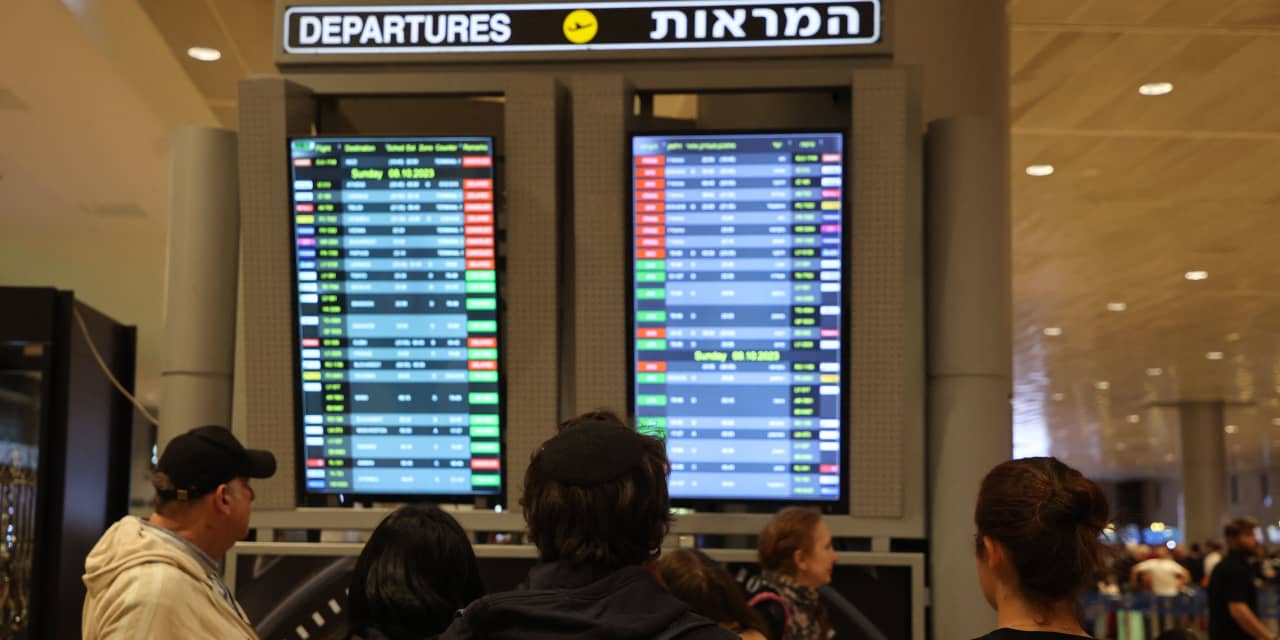The travel sector was by far the weakest segment in the S&P 500 on Monday after Israel was attacked by terror group Hamas. Global markets reacted as airlines faced service disruptions and a surge in oil prices threatened travel profit margins.
A rocket barrage by Hamas and violent incursions into Israeli territory by its operatives from the Gaza Strip over the weekend killed hundreds, saw dozens taken hostage, and prompted airstrikes on Gaza that has further added to the civilian death toll. The worst attack against Israel in decades has injected markets with fresh geopolitical risks amid worries that a new chapter in the Israeli-Palestinian conflict could draw in regional players and disrupt global energy supplies.
Airline stocks have been an early barometer of investor nerves—likely, in part, because of disruptions faced by international carriers as a result of the violence.
Delta Air Lines
(ticker: DAL),
American Airlines
(AAL), and
United Airlines
(UAL) all canceled flights to and from Israel’s Ben Gurion Airport outside Tel Aviv over the weekend, The Wall Street Journal reported, citing the companies. The carriers joined other international airlines from Europe and Asia in stopping or limiting service to Israel amid caution from regulators.
The Federal Aviation Administration (FAA), for its part, warned on Saturday that due to the ongoing conflict, pilots should exercise “extreme caution” in Israeli airspace.
Hamas claimed it has targeted Ben Gurion Airport with rockets in response to Israeli airstrikes on Gaza, the military wing of the terror group said in a statement on Monday, though there were no reports of damage to the airport. The Israel Airports Authority had said Ben Gurion Airport continued to handle arrivals and departures.
Delta stock was down 5.8% on Monday, with shares in American Airlines falling 5.6% and United stock dropping 6.2%. European airline stocks also were under pressure, with
Air France-KLM
(AF.France) shares falling 7.5% and
Deutsche Lufthansa
(LHA.Germany) sliding 4.2%. The
U.S. Global Jets ETF
(JETS), an exchange-traded fund tracking the airline industry, fell 3.9%, on track for its worst day since March.
These declines across airline stocks looks somewhat extreme given the relatively limited role in servicing Tel Aviv—until investors consider the energy angle.
“The shocking attacks in Israel have sent the price of oil soaring, as investors assess the potential for the conflict to disrupt supply in the Middle East, if other countries are drawn in,” said Susannah Streeter, an analyst at broker
Hargreaves Lansdown.
“This latest jump will fuel inflationary worries.”
Indeed, continuous-contract futures for U.S. benchmark West Texas Intermediate crude jumped more than 4% to $86.50 a barrel on Monday, with analysts eyeing two possible implications for oil prices from the situation in Israel.
The first is the possible involvement of Iran in planning the attacks, as reported by The Wall Street Journal, which could fuel retaliation against the country, a major oil producer. The other is the question of how the violence could impact a U.S. effort to normalize relations between Israel and Saudi Arabia—a key player in global crude markets—with a muted deal reportedly involving increasing oil production.
Jet fuel-reliant airlines are highly sensitive to the price of oil, so a structural change in global crude markets is likely a powerful force behind Monday’s declines in the stock market. The risk of surging fuel costs looks to be hitting the travel sector beyond airlines, too, with cruise operator
Carnival
(CCL) seeing its shares tumble 6.2%.
There may even be a wider question among investors over whether the conflict and its implications dent demand for travel more broadly, with hotel stocks selling off on Monday as well and underperforming the wider market.
Marriott International
(MAR) declined 2.5% with
InterContinental Hotels Group
(IHG) down 4%. The
S&P 500
was off 0.5%, by comparison.
Write to Jack Denton at jack.denton@barrons.com
Read the full article here













Leave a Reply